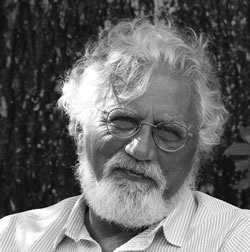Bob Shacochis

|
Bob Shacochis volunteered in the Peace Corps, worked as a journalist and war correspondent, and fiction writer, has published two story collections (Easy in the Islands and The Next New World), two novels (Swimming in the Volcano, and, most recently, The Woman Who Lost Her Soul), and teaches in the M.F.A. program of Florida State University. |
|
photo credit: Kelly Lee Butler |
From an interview by Kevin Rabalais |
 |
|
The only thing I can truly remember about the structure for Swimming in the Volcano is that the novel had a thematic core. It tried to answer where things begin—specifically, where does hate begin. The novel starts and then stops itself to say, "Let’s begin again." By that point, the reader has been filled in with the story’s context, but the narrative doesn’t deliver an answer yet, so we begin again in order to get the context from another perspective. The novel begins again to try to add resolution to the question, Where does hate begin? This sounds a little contrived, but it’s not, thematically, because it’s one of the most important questions ever. The epigraph to Swimming in the Volcano is from Charles Newman: "Forgiveness is based on the fact that there is no adequate form of revenge." After spending ten years writing that novel, I turned, in The Woman Who Lost Her Soul, to a different question: Where does hate end? The Woman Who Lost Her Soul drifts into that zone where no one forgives anybody. What does happen, though, is that the reader forgives the most important character in the book, and that is the woman who lost her soul. When the reader first meets her, she is a very ugly person. A lot of friends who have read the book don’t like her. I say, "Wait, wait," because it’s my job as a writer to make sure that she changes and you understand her so that by the end of the book she breaks your heart and you forgive her. Interviewer Kevin Rabalais is the author of The Landscape of Desire, a novel, and co-editor of Conversations with James Salter (University Press of Mississippi) and the online literary magazine sacredtrespasses.com. | |
